If you’re interested in building and restoring firearms, you might be wondering how to become a gunsmith.
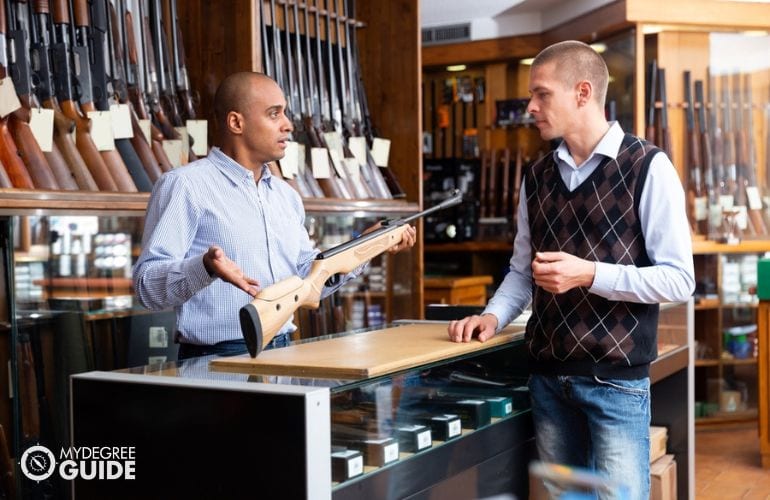
A gunsmith’s primary duties include designing, constructing, and repairing firearms. These professionals often have advanced metalworking and woodworking skills. They also need to thoroughly understand firearm safety mechanisms and gun handling procedures.
Editorial Listing ShortCode:
Becoming a gunsmith is a complex but rewarding process that could lead to a broad range of careers in the military, law enforcement, manufacturing, retail, and other sectors.
How to Become a Gunsmith
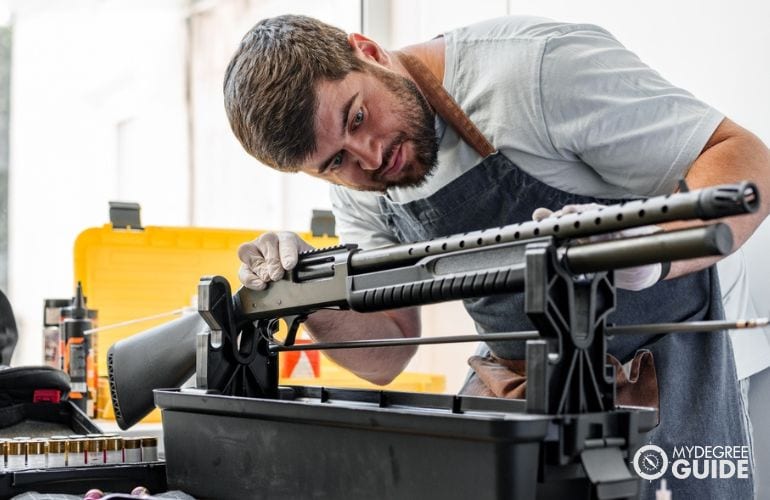
A gunsmith is a highly skilled craftsperson who creates, modifies, or restores firearms. They may design custom guns for clients or modify existing firearms to fit individual users’ unique needs. Many gunsmiths also renovate damaged or old guns.
Editorial Listing ShortCode:
There is no set path to becoming a gunsmith, but people who pursue careers in this profession often complete these steps:
- Learn relevant skills. You can begin your gunsmith journey by acquiring foundational skills. Gunsmiths often use crafts like metal fabrication, metalworking, and woodworking. Many community colleges and arts centers offer short classes in these subjects. You can also get familiar with hand tools commonly used in gunsmithing, such as hammers, pliers, and wood saws.
- Take gunsmith courses. Many colleges, gunsmithing schools, and trade schools online or on campus offer formal training. These programs combine theoretical knowledge with hands-on learning activities. Courses typically cover ballistics, firearm assembly, gun safety, metal finishing, woodworking, and other subjects. Some programs allow students to earn a gunsmithing certificate or diploma, while others grant associate’s degrees.
- Pursue a gunsmithing apprenticeship. Once you’ve gained essential skills and knowledge, you can gain on-the-job experience by apprenticing with an experienced gunsmith. You may find an apprenticeship by networking with local gunsmiths or contacting professional associations.
- Earn a license. You’re required to obtain a federal firearms license to build and sell guns. The licensing process involves several steps, including a background check and an in-person interview with an Industry Operations Investigator. It may also be necessary to obtain state or local licenses.
- Join a professional association. There are several professional gunsmithing organizations in the United States. These associations often offer professional development opportunities like conferences and workshops. They may also host networking events, which can help you connect with mentors and potential employers.
These steps can help you learn how to be a gunsmith and start working with clients.
Gunsmithing Specializations
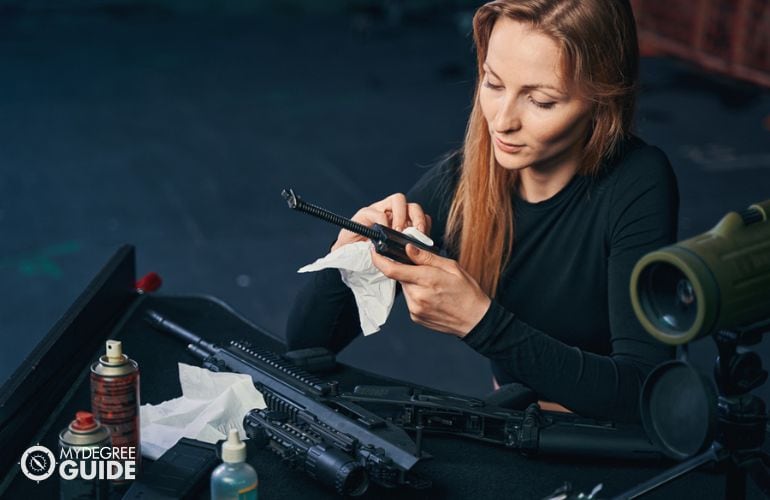
Gunsmithing involves a broad range of skills, so many experts choose to specialize in one aspect of the craft. Popular niches include:
- Custom gunsmiths. These experts build high-end firearms for hunters, professional target shooters, sports shooters, and other clients.
- Gun engravers. These artists create custom designs and engrave them into the steel surfaces of firearms. Clients often decide to etch guns for sentimental reasons or to increase their financial value.
- Manufacturers. These professionals create gun parts like barrels and locks and sell them to other gunsmiths.
- Pistolsmiths. These gunsmiths focus on designing, maintaining, and repairing pistols and revolvers.
- Stockmakers. These specialists use tools like chisels and rasps to carve wood gunstocks and attach them seamlessly to the metal parts of guns.
You can pursue a specialization by enrolling at a gunsmithing school that offers relevant courses or certificates. Additionally, you may gain relevant skills by apprenticing with an expert in your chosen niche.
Gunsmithing Careers & Salaries
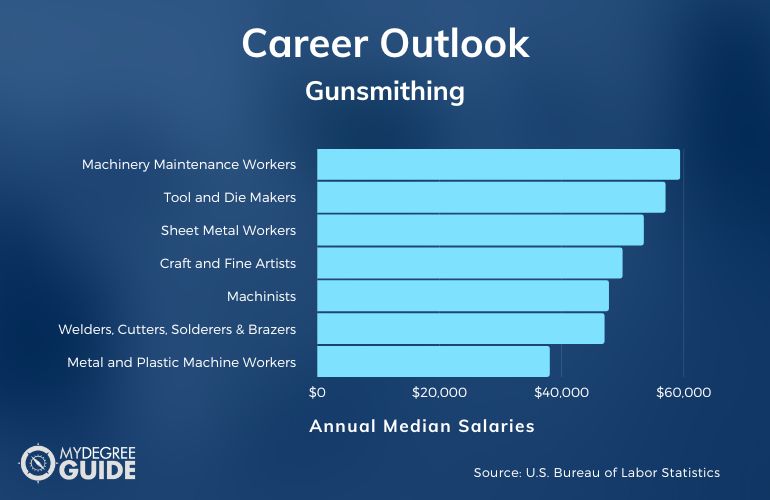
Becoming a gunsmith can open the door to many career opportunities. Many gunsmiths start their own businesses or work in small gunsmith shops alongside other professionals. They may provide comprehensive gunsmithing services or specialize in pistolsmithing, stockmaking, and other niches.
Employers that frequently hire gunsmiths include armories, factories, firearms manufacturers, gun shops, law enforcement departments, military, and sporting goods retailers. According to the Bureau of Labor Statistics, here are potential careers connected to gunsmithing and their annual median salaries.
| Careers | Annual Median Salaries |
| Industrial Machinery Mechanics, Machinery Maintenance Workers, and Millwrights | $59,380 |
| Tool and Die Makers | $57,000 |
| Sheet Metal Workers | $53,440 |
| Craft and Fine Artists | $49,960 |
| Machinists | $47,730 |
| Welders, Cutters, Solderers, and Brazers | $47,010 |
| Metal and Plastic Machine Workers | $38,040 |
| Assemblers and Fabricators | $37,170 |
| Woodworkers | $36,710 |
| Retail Sales Workers | $29,180 |
Some gunsmiths apply their skills by pursuing careers in related industries. For example, a gunsmith might use their woodworking skills to become a construction worker or carpenter.
Similarly, people trained in gunsmithing can apply their design and manufacturing knowledge to become machinists, design engineers, or engineering technologists. Some engineering positions may require additional education. Job availability and salaries can differ based on your geographic area, employer, education, and other factors.
Editorial Listing ShortCode:
But, you may increase your chances of securing a preferred position by earning a gunsmithing certification, completing an apprenticeship, and joining a professional association.
Gunsmith Programs Accreditation
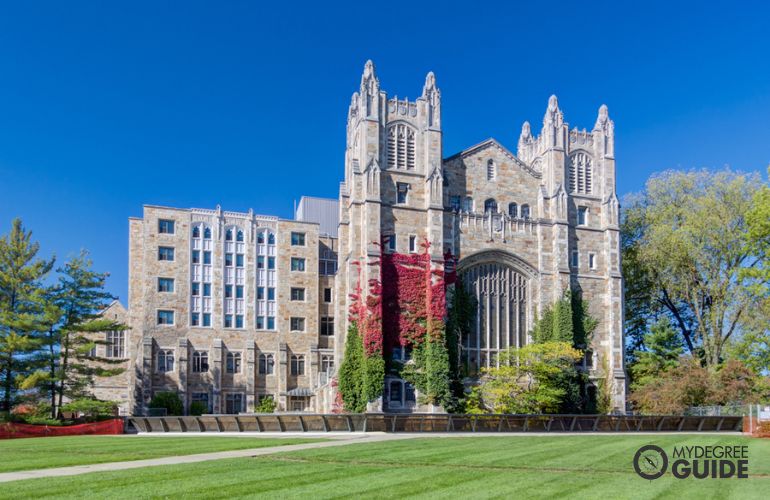
As you research gunsmithing schools, it’s helpful to investigate each institution’s accreditation status. Schools can receive accreditation if they meet criteria established by independent accrediting associations. These organizations assess schools based on their courses, faculty credentials, financial aid resources, student support services, and other factors.
You can set yourself up for a first-rate education by attending an accredited gunsmithing program. Also, accredited schools are widely respected, so potential employers and mentors are more likely to trust that you have the knowledge and skills needed to succeed in gunsmithing.
Is Financial Aid Available?

Many students worry about tuition costs, but you can see if you qualify for financial aid to help pay for your gunsmithing certificate or degree.
You can start researching financial aid opportunities by completing the Free Application for Federal Student Aid (FAFSA). This application collects information about your household’s financial status to determine if you’re eligible for federal aid. Federal support can include grants, scholarships, subsidized student loans, and work-study programs.
Plus, most schools offer internal grants and scholarships to eligible students. You can inquire with each school’s financial aid office to find out if you qualify.
Gunsmithing Professional Organizations

You might unlock professional development and networking opportunities by joining a gunsmithing association, such as:
- American Gunsmithing Association (AGS): This organization publishes a free monthly newsletter that teaches basic and advanced gunsmithing techniques.
- National Rifle Association (NRA): This association provides numerous firearms education programs and coordinates events across the United States.
- National Shooting Sports Foundation (NSSF): This organization offers educational content, research, and industry discounts.
Members of professional gunsmithing organizations have access to the latest research in the industry. These agencies may also offer financial aid resources for aspiring gunsmiths.
What Is a Gunsmith?
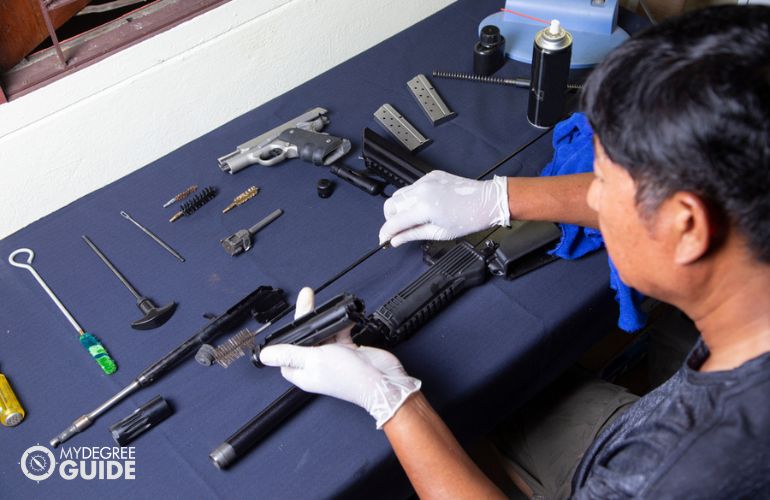
A gunsmith is a highly trained craftsperson who designs and repairs firearms. Professionals in the field have extensive knowledge of the inner mechanisms of firearms and methods to fire guns safely. They can build custom guns or adapt manufactured guns to fit their clients’ preferences.
For instance, a gunsmith could design a high-end rifle for an avid hunter or engrave a design on an heirloom pistol. Gunsmiths often focus on one aspect of the profession. Some experts focus on pistol smithing, which is the design and renovation of pistols. Others manufacture gun parts, like barrels or gunstocks.
What Does a Gunsmith Do?
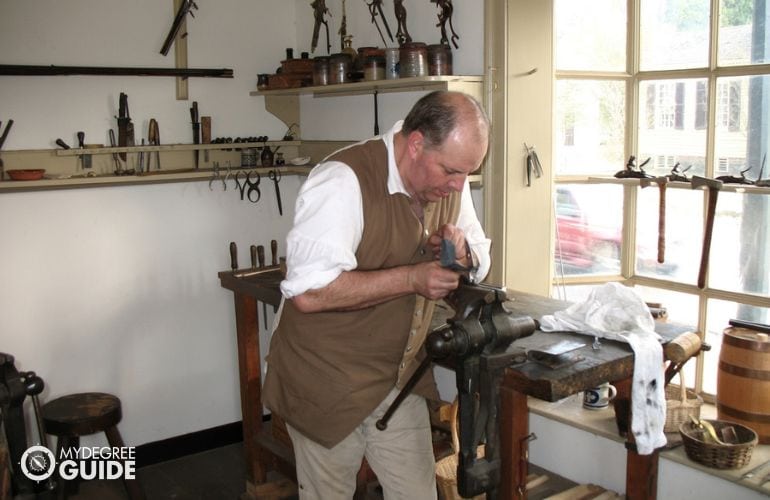
A gunsmith builds, maintains, and improves firearms. Their daily responsibilities can vary depending on their employer and role, but everyday tasks may include:
- Adapting guns to fit their clients’ bodies
- Calibrating guns
- Educating clients about firearm safety protocols
- Engraving guns with unique designs
- Removing rust from guns
- Repairing firearms under manufacturer warranties
- Safely testing firearms
- Staying up-to-date with federal, state, and local firearm regulations
- Upgrading firing mechanisms
- Cleaning firearms
- Inspecting guns for safety hazards
- Renovating historical firearms
A gunsmithing apprenticeship or certificate can help you gain the skills needed to perform these duties.
Are Gunsmiths in Demand?
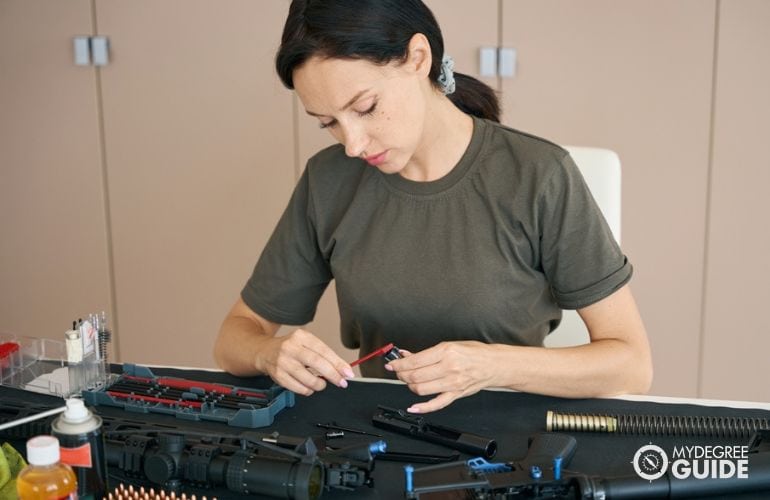
Gunsmithing is a niche field, so career opportunities may be limited. The Bureau of Labor Statistics classifies gunsmiths as metal and plastic machine workers.
The demand for this overall category of workers is projected to decrease by 5% over the next ten years. But, around 101,700 new jobs are anticipated to open annually for these workers during this period. The data for this job category does not account for the need for gunsmiths in particular.
Editorial Listing ShortCode:
As people continue to purchase and collect firearms for protection, for sport, for hobbies, and even for law enforcement, gunsmiths will continue to be needed to sell, repair, maintain, modify, and restore these guns.
Where Do Gunsmiths Work?
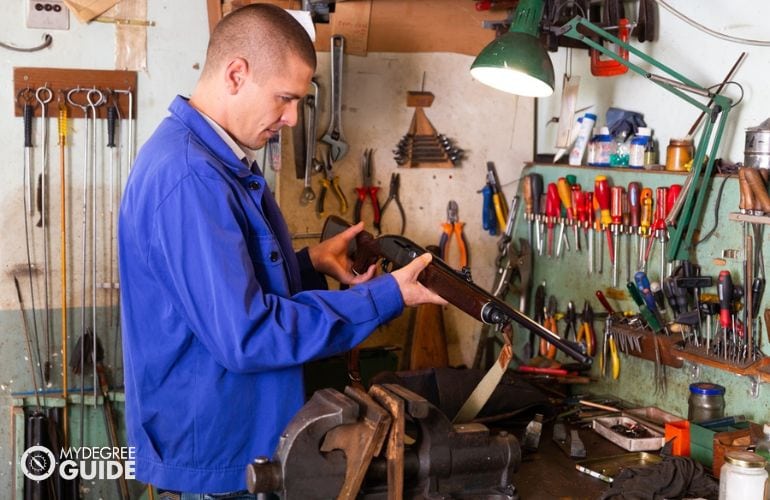
Graduates with a gunsmithing certificate or degree may secure jobs with a wide range of employers. Many gunsmiths begin their careers by working in small gunsmithing shops, where they often serve as apprentices. Later, they may launch independent gunsmithing businesses.
Others work for gun ranges and sporting goods stores. They may educate clients about gun safety and repair firearms. Additionally, gunsmiths often work for factories and manufacturers. They can design and evaluate new products or repair firearms under warranty. Finally, law enforcement agencies and the military employ gunsmiths to maintain and purchase their service weapons.
What Are the Skills Needed to Be a Gunsmith?

A gunsmith needs to possess a wide range of interpersonal and technical skills. Here are a few crucial abilities to learn:
- Attention to detail
- Communication skills so you can interpret your clients’ needs and explain your work
- Crafting abilities in engraving, machining, metalworking, and woodworking
- Customer service skills
- Mathematical skills to calculate gun dimensions
- Operating a spray gun to apply finishes to guns
- Problem-solving skills to diagnose issues with firearms
- Using hand tools to chisel, engrave, file, solder, and weld guns
A gunsmithing school or apprenticeship can help you hone many of these abilities.
Should I Become a Gunsmith?
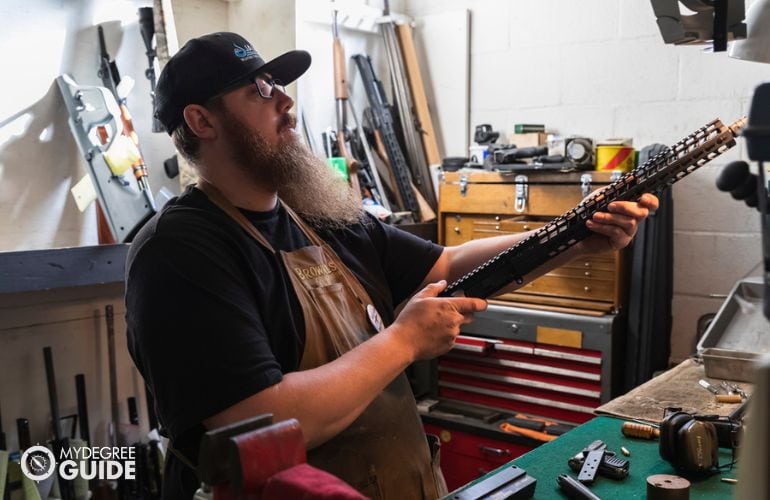
Only you can decide if you should pursue a gunsmith career, but here are a few signs that you may enjoy this profession:
- You like helping people enjoy their hobbies.
- You’re fascinated by the history of guns and would like to restore old firearms.
- You’re passionate about studying different types of guns and comparing their specs.
- You like to work with your hands and use tools like hacksaws and chisels.
- You spend your free time at the firing range or hunting.
If some of these statements describe you, you might find a gunsmithing career rewarding.
What Education Do You Need to Be a Gunsmith?
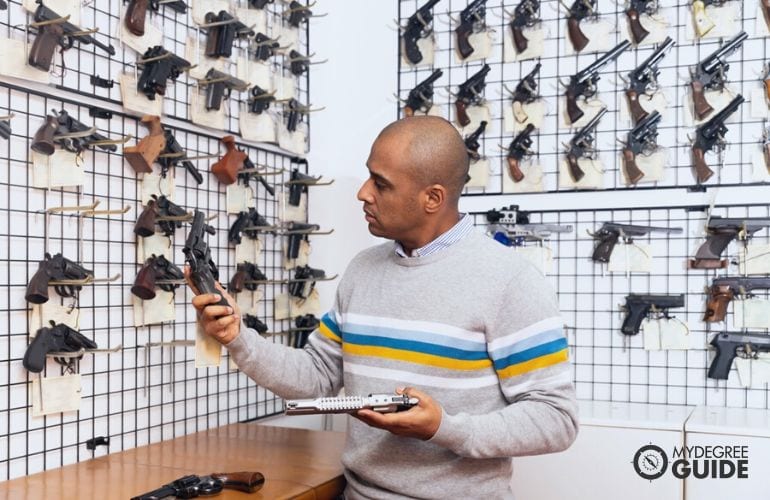
You can follow several educational paths to become a gunsmith. Many people enter the profession by completing a gunsmithing apprenticeship. This opportunity allows aspiring gunsmiths to gain practical experience under the mentorship of an experienced professional.
Others choose to enroll in a gunsmithing school for formal training. These programs cover custom gunsmithing, firearm safety, woodworking, and other crucial subjects. At the end of the program, you may earn a gunsmithing certificate or degree. It’s also necessary to obtain a federal firearms license before working with clients.
How Long Does It Take to Become a Gunsmith?

The length of time it takes to become a gunsmith depends on several factors, including the educational path you choose. Typically, a gunsmithing certificate programs takes 6 months to 1 year to complete. Also, some gunsmithing schools offer short, unaccredited courses that may last 1 to 2 weeks.
You could also pursue an associate degree in gunsmithing. Full-time students can generally finish associate degrees in 16 months to 2 years, while part-time students may take 3 years to finish their degree. Some students complete a gunsmithing apprenticeship alongside or in place of formal education programs. An apprenticeship usually lasts 1 to 2 years.
Is Gunsmithing a Good Career?
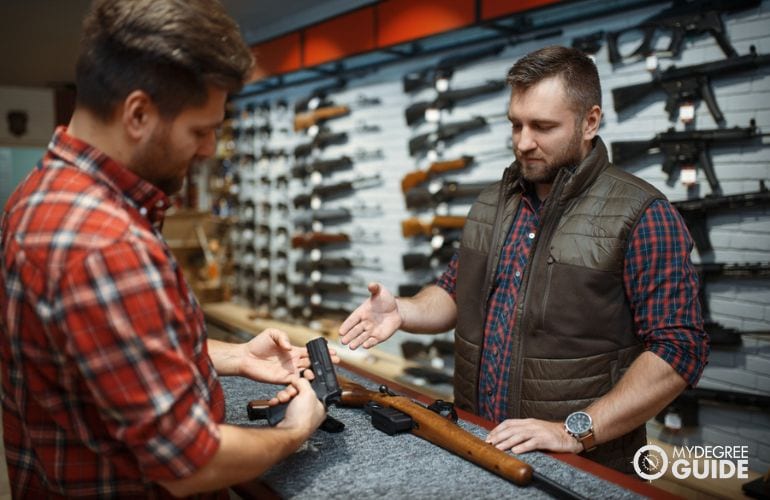
Yes, gunsmithing is a good career for many professionals. This career allows you to expand your knowledge of the history, functions, and inner workings of firearms.
Many people who feel passionate about guns enjoy turning their hobby into career potential. Learning gunsmithing can unlock many job opportunities. Business-minded gunsmiths can launch their own gunsmithing shops. Others choose to work for small gunsmithing companies, shooting ranges, or sporting goods retailers. You can also apply your gunsmithing knowledge by working for firearms manufacturers.
Editorial Listing ShortCode:
People who enjoy solving problems and working with their hands may find this career path particularly rewarding.
Getting Your Gunsmithing Training Online

Becoming a gunsmith is a fulfilling career for many people. You can study the intricate mechanisms of firearms and learn about crafts like metalworking and woodworking in an in-person or online gunsmith certificate program. Plus, you can save lives by educating your clients about gun safety and ensuring their firearms are in peak working condition.
There are many paths to becoming a gunsmith. Online gunsmithing schools can help you learn the fundamental skills needed to build and repair firearms safely. You can study subjects like ballistics, machining, and shooting sports management.
Why not start your gunsmithing journey today by researching online gunsmith programs from accredited schools?

